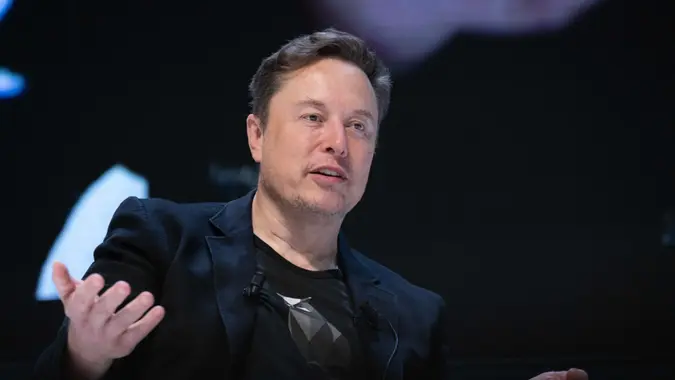4 Ways Elon Musk’s Desired Cuts of Government Spending Could Affect Consumers Financially

Commitment to Our Readers
GOBankingRates' editorial team is committed to bringing you unbiased reviews and information. We use data-driven methodologies to evaluate financial products and services - our reviews and ratings are not influenced by advertisers. You can read more about our editorial guidelines and our products and services review methodology.

20 Years
Helping You Live Richer

Reviewed
by Experts

Trusted by
Millions of Readers
Many families and single consumers are wondering what changes under the Department of Government Efficiency (DOGE) may impact their finances. Billionaire Elon Musk’s department was put in place by President Donald Trump to trim federal spending. According to CBS News, Musk aims to cut $500 billion in annual federal spending.
Here’s a look at four ways some of Musk’s desired cuts of government spending could impact you financially.
Pay More for Everyday Needs
DOGE may go after federal programs and their discretionary spending, which is money without current congressional authorization. Some cuts to Social Security, Medicare and Medicaid could be included in the discretionary spending category, though leaders of DOGE haven’t said anything about cuts to these programs.
Why should you care? Cuts in discretionary spending to federal programs could impact how much you pay for things such as gas and healthcare.
“These proposed cuts need to be scrutinized, because they could affect the financial well-being of American consumers,” said Gagan Saini, a finance and business expert and CEO of We Buy Houses in Central Valley.
Pay More for Transportation and Education
DOGE may go after spending cuts in areas that trickle down and mean families pay more in areas where they may already be struggling.
“Musk’s proposed government spending cuts will also greatly impact the wallets of everyday Americans by reducing social services and investment in infrastructure,” Saini said. “This might result in higher out-of-pocket costs for transportation, healthcare and education — expenses that many families are already struggling to pay.”
Pay More for Housing
“When I work with homeowners and investors across the Central Valley, I see how government programs support their ability to maintain stable housing and build wealth,” Saini said. “Cutting these programs would force many families to make difficult financial choices, potentially delaying homeownership or retirement savings.
“The ripple effects would be in multiple areas: Less funding for public transportation would force people to use more expensive cars, and reducing housing assistance would increase rent costs for renters in vulnerable groups. Small businesses would also feel the pinch when consumers tightened their spending in reaction to taking on more financial burdens.”
Wait Longer for Tax Refunds
Musk and Trump have talked about their desires to reduce the federal workforce. They’ve suggested that putting an end to remote work options would lead to natural attrition. DOGE could also recommend offering early retirement to reduce the federal workforce.
The trickle-down effect could be higher prices in communities where many federal workers live amid lower spending. You may also experience a longer delay in receiving your tax refund thanks to fewer workers and slower processing time.
However, none of the proposed spending cuts have yet gone into effect, and it’s impossible to know for sure what the effects will be on the average consumer.
Editor’s note on political coverage: GOBankingRates is nonpartisan and strives to cover all aspects of the economy objectively and present balanced reports on politically focused finance stories. You can find more coverage of this topic on GOBankingRates.com.
More From GOBankingRates
 Written by
Written by  Edited by
Edited by 

























